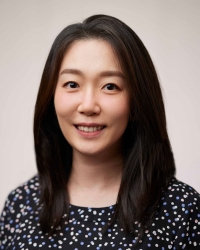Position: Assistant Professor
Education: Ph.D., University of Georgia, 2018
Email: mguan@ou.edu
Office: Burton Hall Rm 223
Office hours: By appointment

Position: Assistant Professor
Education: Ph.D., University of Georgia, 2018
Email: mguan@ou.edu
Office: Burton Hall Rm 223
Office hours: By appointment
Dr. Guan’s research interests focus on message effects, risk perception, and behavior change in the realms of health, risk, and science communication. In particular, she is interested in examining the role of different message design strategies in shaping people’s responses to persuasive messages. Her research also touches upon the impact of audience characteristics on message processing and risk-reducing behaviors as well as communication about social determinants of health.
Guan, M., Li, Y., Scoles, J. D., & Zhu, Y. (2023). COVID-19 message fatigue: How does it predict behavioral intentions and what types of information are people tired of hearing about? Health Communication, 38(8), 1631-1640. https://doi.org/10.1080/10410236.2021.2023385. Featured in the CDC Health Communication Science Digest (January 2022, Vol. 13, Issue 1e)
Zhuang, J., & Guan, M. (2022). Modeling the mediating and moderating roles of risk perceptions, efficacy, desired uncertainty, and worry in information seeking-cancer screening relationship using HINTS 2017 data. Health Communication, 37(7), 897-908. https://doi.org/10.1080/10410236.2021.1876324
Guan, M., Jennings, F. J., Villanueva, I. I., & Jackson, D. B. (2022). Delineating antecedents and outcomes of information seeking upon exposure to an environmental video opposing single-use plastics. Environmental Communication, 16(4), 563-57. https://doi.org/10.1080/17524032.2022.2102048
So, J., Ahn, J., & Guan, M. (2022). Beyond depth and breadth: Taking “types” of health information sought into consideration with cluster analysis. Journal of Health Communication, 27(1), 27–36. https://doi.org/10.1080/10810730.2022.2029978
Guan, M., Han, J. Y., Shah, D. V., Gustafson, D. H. (2021). Exploring the role of social support in promoting patient participation in health care among women with breast cancer. Health Communication, 36(13), 1581-1589. https://doi.org/10.1080/10410236.2020.1773704
Li, Y., Guan, M., Hammond, P., & Berrey, L. E. (2021). Communicating COVID-19 information on TikTok: A content analysis of TikTok videos from official accounts featured in the COVID-19 information hub. Health Education Research, 36(3), 261-271. https://doi.org/10.1093/her/cyab010. “Editor’s Choice” article of the issue
Guan, M., & So, J. (2020). Tailoring temporal message frames to individuals’ time orientation strengthens the relationship between risk perception and behavioral intention. Journal of Health Communication, 25(12), 971–981. https://doi.org/10.1080/10810730.2021.1878310. Featured in the CDC Health Communication Science Digest (February 2021, Vol. 12, Issue 2e)
Guan, M., & So, J. (2016). Influence of social identity on self-efficacy beliefs through perceived social support: A social identity theory perspective. Communication Studies, 67(5), 588–604. https://doi.org/10.1080/10510974.2016.1239645
Guan, M., Coles, V. B., Samp, J. A., Sales, J. M., DiClemente, R. J., & Monahan, J. L. (2016). Incorporating communication into the theory of planned behavior to predict condom use among African American women. Journal of Health Communication, 21(9), 1046–1054. https://doi.org/10.1080/10810730.2016.1204383